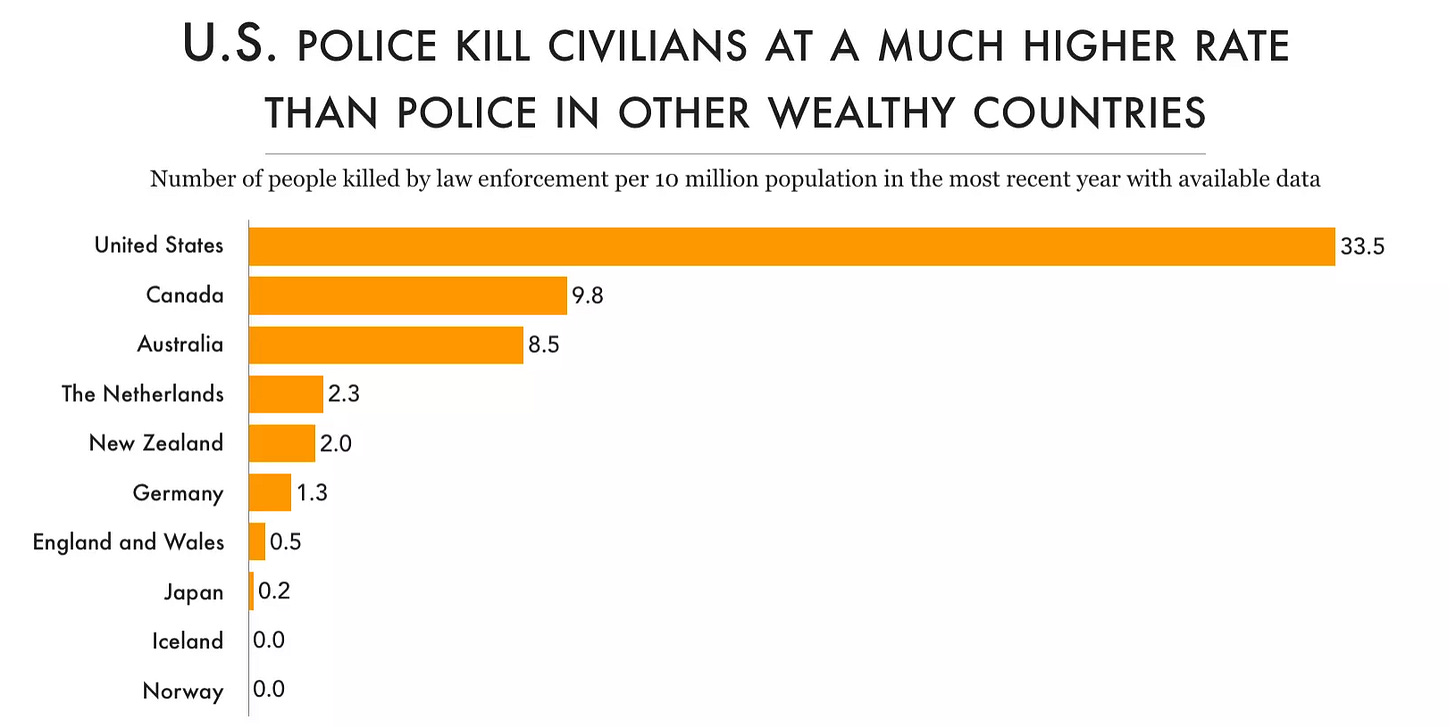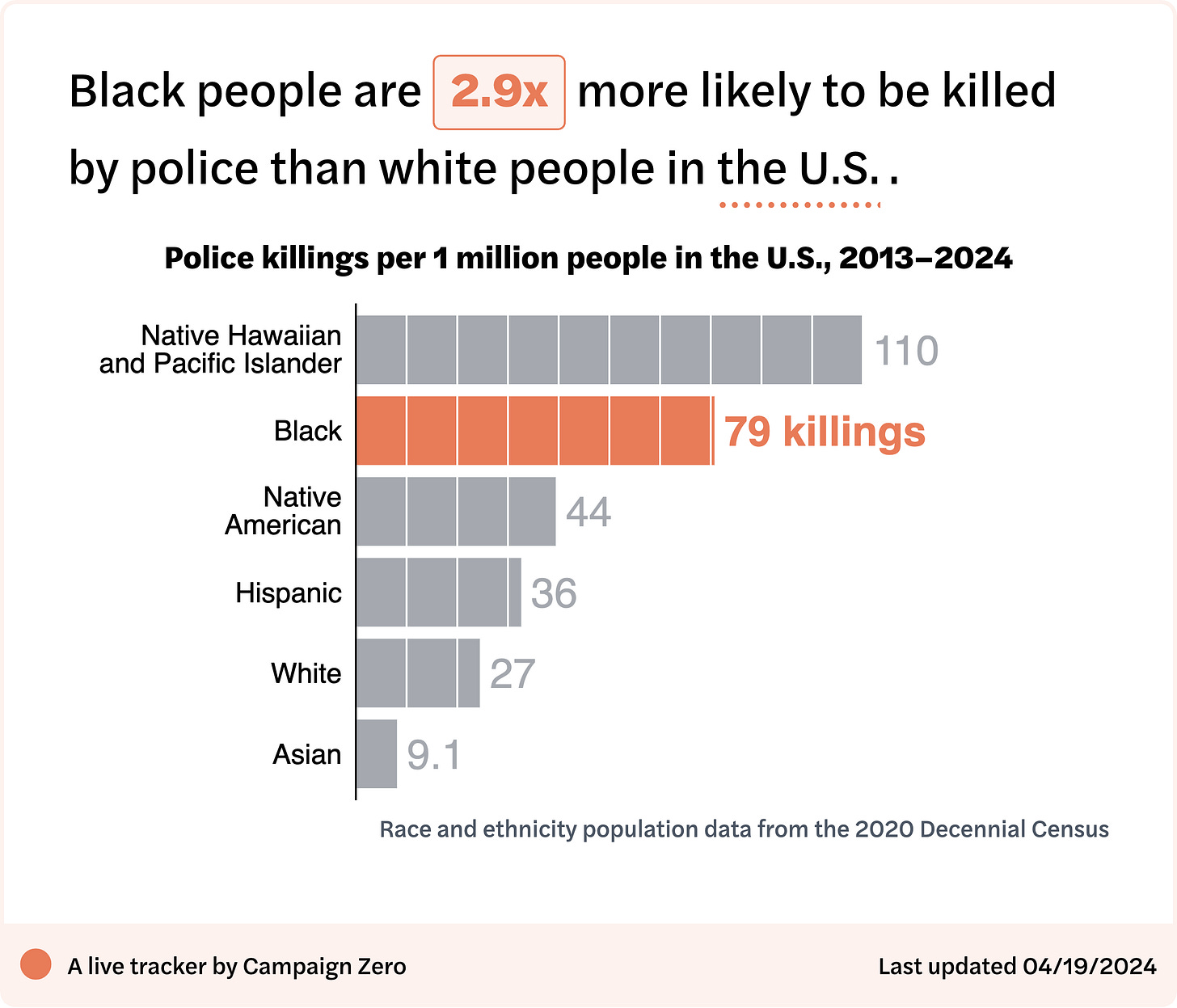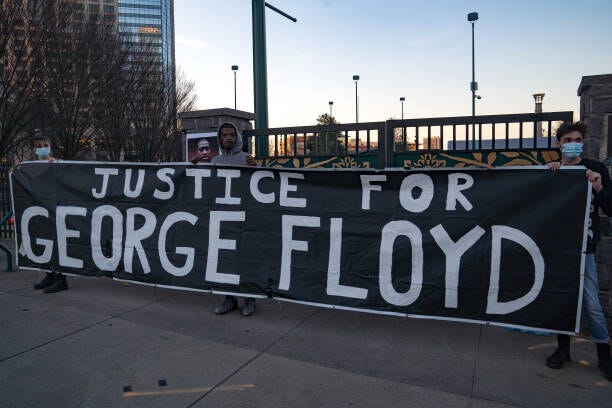Do Not Let Media Ignore the Tragic Police Killing of U.S. Airman Roger Fortson
The United States Continues to Lead the Developed World in Police Murders — But It Doesn't Have To Be This Way
As a human rights lawyer I’ve had the opportunity to train law enforcement on Constitutional Law—particularly on Fourth Amendment right to privacy protections during search and seizure. I always start my training with the following statement.
You are a government agent with the ability to use lethal force. Ensuring your power is kept in check is why we have the Bill of Rights. That’s why it is imperative you treat these rights as sacred, because it will determine life or death for members of the public.
Unfortunately, the United States massively leads the developed world in police killings of its residents. My critique of policing in America is not a critique of individual officers—it’s a critique of a system that is failing to meet the needs of the hour because it was not built to meet the needs of the hour. The tragic murder of U.S. Airman Roger Fortson on May 3 is a painful example of that failure, and why we need change.
In response to a 911 call on May 3, 2024 intended for another resident of Osalooka County, Florida, Osalooka County Police arrived at around 4pm at the home of active duty U.S. Airman Roger Fortson, a 23 year old Black man, and shot him dead.
The video cam footage—which I will not be showing—shows that the officer knocked on Roger Fortson’s door and then moved to the side multiple times, preventing Roger from seeing who was knocking. Roger, who had been on a FaceTime call with a friend, grew concerned and retrieved his legally procured and maintained firearm. Roger opened his own door, after which the police officer appeared in front of him and within 1 second, shot him multiple times, killing him. In total, the officer shot Roger Fortson six times, while offering no explanation of who he was or why he was there. The officer made no attempt to deescalate or to give Roger the opportunity to respond to any command—he just shot Roger dead.
Roger’s tragic murder at the hands of law enforcement is part of an epidemic of police murders in the United States—something no other developed world experiences. For example, cross the border to our northern neighbor Canada and your likelihood of being killed by law enforcement drops 3 fold. Visit New Zealand and your risk drops 15 fold. Visit Japan and your risk drops 168 fold. When Iceland police killed a civilian in 2013—it was a first in the nation’s history.
While exact numbers do not exist because law enforcement is remarkably not required to report when they kill a civilian, experts record the number of people law enforcement kills somewhere between 1200 and 2000 people annually. Furthermore, Black people suffer fatal police violence at a rate of nearly 3X that of white people.
It does not have to be this way, and we can address police violence with proven methods and meaningful budget allocations in at least the following three ways.
First, we must recognize that law enforcement responds to crime, but a living wage, food and water security, accessible healthcare, and public education prevent crime. If we want safer communities, invest in people, not punishments. This means investing more in mental health professionals, suicide prevention experts, addiction experts, and social workers in general. Cities like Denver have done so by sending mental health professionals instead of police officers, and have seen the positive results first hand.
Likewise, we must end Qualified Immunity. Qualified Immunity is not in the U.S. Constitution, not in any State Constitution, nor is it part of any state or federal legislation. It is purely Court created to protect law enforcement from accountability when they unjustly harm or kill civilians. As the Equal Justice Initiative explains:
Qualified immunity is a court-created rule that limits victims of police violence and misconduct from holding officers accountable when they violate a person’s constitutional rights.
And worse, it was concocted by the Supreme Court over the course of nearly a century as a means to advance white supremacy in America. You can read a thorough analysis here. Ending Qualified Immunity would not default condemn any police officer for an innocent wrongdoing, but it would ensure those who are harmed have their day in court to have their cases heard. It is no surprise therefore that nearly 2 in 3 Americans, or 62% of Americans, support ending Qualified Immunity.
Finally, we must pass the George Floyd Justice In Policing Act. This act ends Qualified Immunity, bans no knock raids (like the one that killed Breonna Taylor), and ends lethal choke holds. These are all common sense steps to good policy and public safety. No person across the political spectrum should feel comfortable handing over unquestioned lethal authority to a government agent, period.
While there are several more comprehensive methods to stop or decrease police violence, the aforementioned three are a strong starting point.
Roger Fortson was only 23 years old. He served in the armed forces. He did everything right. And still our system failed him in the most cruel and brutal manner. Like the police murders of Philando Castile, Breonna Taylor, Eric Garner, Daniel Shaver, and too many others, the police murder of Roger Fortson should be a wake up call that this method of policing is not only cruel and harmful, but also unsustainable.
Fortunately, we have the tools available to us to ensure law enforcement sacredly protects the Bill of Rights, especially when engaging with the community members they are commissioned to serve. We can enforce those protections with adequate community resources, by ending Qualified Immunity, and by passing the George Floyd Act.
Ultimately, if our elected officials are not willing to vote for legislation that will accomplish the above, and we cannot change their minds to do so, then it is critical we activate, organize, and change their seats by voting them out permanently.






Such a death as described here is totally beyond understanding, to say the least. And I'm curious about the person on the other end of the FACETIME phone call. Could that person be considered a witness?
First, why didn’t the officer tell him to drop the gun? Second, why do they shoot to kill? There is no excuse for what happened to that man!